Trinity Logistics, a leading third-party logistics provider (3PL), is thrilled to share that its Technology Team has been recognized as one of the Top 10 Technology Teams by OnConferences. This prestigious award honors organizations that have demonstrated exceptional innovation, technical expertise, and a commitment to delivering leading solutions.
Trinity’s Technology Team plays a vital role in supporting the company’s operations and delivering exceptional service to its clients. The Team is responsible for developing and implementing cutting-edge technology solutions that enhance efficiency, improve customer service, and drive growth.
“The Trinity Technology Team continues to deliver innovative solutions driving business outcomes and effectively supporting our Team Members,” said Russ Felker, Chief Technology Officer at Trinity Logistics. “From cybersecurity to integrations to data availability to custom development, they consistently provide exemplary service and support for Team Trinity and its partners.”
OnConferences is a leading provider of educational conferences and networking opportunities for professionals across many industries. Its Top 10 Technology Teams award is determined through peer and community voting. Voters are instructed to select teams that they have seen make a significant impact on their own organization or within the broader industry, contribute to their professional community through thought leadership, drive innovation, and demonstrate exceptional leadership.
Trinity’s Technology Team and their dedication to excellence, innovative practices, and leadership have set them apart as a top-performing team. The Team has made remarkable achievements like a full migration to the cloud in only eight months, multiple new customer and vendor integrations, improved and differentiated functionality within Trinity’s custom Transportation Management System (TMS), and increased data availability for Team Members and the company’s Agent partners. These accomplishments helped them stand out from the rest of the submissions, distinguishing them as an outstanding Team.
Trinity Logistics is committed to investing in purposeful technology and great talent to ensure its respected culture and exceptional service stay at the forefront of its continued success. As the company continues to grow and evolve, this recognition serves as a testament to that ongoing promise.
LEARN MORE ABOUT TRINITY LOGISTICS TECHNOLOGY VIEW THE FULL LIST OF WINNERSAbout Trinity Logistics
Trinity Logistics is a Burris Logistics Company, offering People-Centric Freight Solutions®. Our mission is to deliver creative logistics solutions through a mix of human ingenuity and innovative technology, enriching the lives of those we serve.
For the past 45 years, we’ve been arranging freight for businesses of all sizes in truckload, less-than-truckload (LTL), warehousing, intermodal, drayage, expedited, international, and technology solutions.
We are currently recognized as a Top Freight Brokerage by Transport Topics, a Green Supply Chain Partner by Inbound Logistics, and a Top Company for Women to Work for in Transportation by the Women in Trucking Association.
About OnConferences
OnConferences is a leading organization that connects top professionals across various industries, promoting collaboration, innovation, and thought leadership. Through conferences, awards, and networking opportunities, OnConferences provides a platform for executives and organizations to exchange insights, fostering growth and development within their respective fields.
Trinity Logistics, a leading third-party logistics provider (3PL) offering logistics and supply chain solutions, proudly shares its recognition as a Top Company for Women to Work for in Transportation by the Women in Trucking Association (WIT) for the sixth consecutive year.
This prestigious honor highlights companies that demonstrate a commitment to gender diversity, inclusivity, and career advancement for women in the transportation industry. Trinity Logistics ranked highly in these areas, and the nomination was validated by an industry-wide vote involving over 31,000 transportation professionals.
“As someone who has spent my career in male-dominated industries and being relatively new to Trinity with just over two years here, I feel an immense sense of pride that Trinity has been recognized for the sixth consecutive year as a Top Company for Women to Work for in Transportation,” said Carlie Crouch, Director of Talent Management at Trinity. “There is a deep sense of understanding and support at Trinity—as mothers, coworkers, and friends. The ability to balance all aspects of my life while feeling seen and heard as a woman is something I truly value. As the Director of Talent Management, I enjoy sharing with future team members the incredible opportunities available at Trinity for women to thrive and succeed. I’m proud to be part of Team Trinity.”
Key features that distinguished Trinity Logistics included its positive and family-friendly culture that supports diversity, competitive pay, quality benefits for employees and their families, ample time off, flexible work arrangements to encourage work-life balance, and extensive professional development opportunities.
“This achievement reflects our commitment to creating an inclusive environment where every Team Member can thrive,” said Amy Proctor, Senior Vice President of Logistics Solutions at Trinity. “We continue to empower our Team to reach new heights. In my own journey here, I’ve seen firsthand how our culture of collaboration and growth makes a real difference. The opportunities for leadership development, mentorship, and professional growth have shaped my career and allowed me to contribute in meaningful ways. It’s inspiring to see the impact women have across our company and I’m proud to be part of a Team that champions opportunity for all.”
To date, Trinity employs over 400 Team Members across six Regional Service Centers, with more than half of them being women. Notably, 16.7 percent of these women hold management or leadership roles, including the current President, Sarah Ruffcorn, who also serves as co-chair on the Women in Logistics Committee with the Transportation Intermediaries Association (TIA).
“We’re incredibly honored to receive this award for a 6th year!” said Sarah Ruffcorn, President of Trinity Logistics. “This achievement reflects our amazing Team that continues to live and create a culture in which anyone can thrive. We’re proud of our efforts to continuously offer a supportive environment, ensuring our Team Members have the opportunity to succeed and grow.”
Trinity Logistics thanks WIT for the recognition and wants to congratulate all the companies that made the list.
LEARN MORE ABOUT TRINITY LOGISTICSAbout Trinity Logistics
Trinity Logistics is a Burris Logistics Company, offering People-Centric Freight Solutions®. Our mission is to deliver creative logistics solutions through a mix of human ingenuity and innovative technology, enriching the lives of those we serve.
For the past 45 years, we’ve been arranging freight for businesses of all sizes in truckload, less-than-truckload (LTL), warehousing, intermodal, drayage, expedited, international, and technology solutions.
We are currently recognized as a Top Freight Brokerage by Transport Topics, a Green Supply Chain Partner by Inbound Logistics, and holds a bronze sustainability rating by EcoVadis.
Trinity Logistics, a leading third-party logistics provider (3PL), is proud to announce the promotions of two dedicated Team Members, Kimberley Pant and Tracy Mitchell.
Pant, who has been with Trinity Logistics for an impressive 18 years, has been promoted to Director of After Hours Operations. Throughout her tenure, Pant has held various positions, such as Carrier Sales Representative, Senior Account Manager, and Operations Team Lead.
“I am thrilled and truly honored for this new opportunity,” said Pant. “My path has been marked by a steadfast commitment to operational excellence and I’ve been fortunate to work alongside a talented and dedicated Team. My primary focus in this new role will be enhancing the quality and efficiency of our services during non-business hours. I will continue ensuring that we meet and exceed expectations of our customers and stakeholders. I’m incredibly grateful for the trust that’s been placed in me and am eager to embrace the challenges and responsibilities that come with this new role.”
Mitchell, who is celebrating nine years at Trinity, has progressed through several roles in the Billing Department, now promoted as the new Director of Accounts Receivable. In this new role, Mitchell aims to develop strategies for fraud prevention, enhance operational efficiencies, and strengthen partnerships with relevant organizations, like the National Association of Credit Management (NACM).
“I am incredibly honored and excited to step into the role of Director of Accounts Receivable,” said Mitchell. “This promotion is a significant milestone in my career growth, and I’m eager to contribute to the continued success of Trinity. I look forward to being challenged by my new goals and responsibilities, with my primary focus being on developing the Accounts Receivable Team to their fullest potential while elevating Trinity’s brand recognition as an exceptional logistics provider.”
These promotions highlight Trinity Logistics’s commitment to recognizing and rewarding exceptional talent within the organization. Both Pant and Mitchell bring a wealth of experience and expertise to their new roles and will undoubtedly continue to make significant contributions to the company’s success.
LEARN MORE ABOUT TRINITY LOGISTICSAbout Trinity Logistics
Trinity Logistics is a Burris Logistics Company, offering People-Centric Freight Solutions®. Our mission is to deliver creative logistics solutions through a mix of human ingenuity and innovative technology, enriching the lives of those we serve.
For the past 45 years, we’ve been arranging freight for businesses of all sizes in truckload, less-than-truckload (LTL), warehousing, intermodal, drayage, expedited, international, and technology solutions.
We are currently recognized as a Top Freight Brokerage by Transport Topics and as a Top Company for Women to Work for in Transportation by Women in Trucking.
Trinity Logistics, a prominent third-party logistics (3PL) provider, has teamed up with Truck Parking Club to offer discounted parking options for Carriers within its network.
“We understand that Carriers face several challenges daily, but safe parking shouldn’t be one of them,” said Chad Taylor, Vice President of Carrier Development at Trinity Logistics. “This partnership allows us to ease that burden by offering an additional option for our Carrier relationships when they need safe, secure parking.”
Carriers must be registered and set up with Trinity Logistics to take advantage of this new benefit. All current Carrier relationships will be sent email communications with instructions on how to receive their discount. Carriers who decide to capitalize on the for discount for Truck Parking Club will be able to:
- Book a daily parking location. Some locations may also offer hourly, weekly and monthly rates.
- Search for and book parking using an interactive map that displays all available locations across the U.S.
- Search for and book parking when planning a route or by finding a parking spot near a specific location.
- View parking location information, including daily costs and available spaces, as well as amenities such as restrooms, 24/7 access, etc., and contact 27/7/365 customer support (staffed by former drivers) to ask any questions.
“Truck Parking Club was created to help truckers save time and fuel by finding and instantly reserving truck parking across the US,” said Evan Shelley, CEO at Truck Parking Club. “Our solution brings more truck parking online quickly by enabling owners to list space on their existing yards and properties. Our trucker members, and now Trinity Logistics carriers, are then able to quickly search and reserve available truck parking spaces, allowing them to plan a trip with confidence knowing they have a parking space. We are excited to partner with Trinity Logistics, as we think our solution is a great value add to their carrier partners.”
For more information about the Truck Parking Club, visit truckparkingclub.com
LEARN MORE ABOUT TRINITY LOGISTICSAbout Trinity Logistics
Trinity Logistics is a Burris Logistics Company, offering People-Centric Freight Solutions®. Our mission is to deliver creative logistics solutions through a mix of human ingenuity and innovative technology, enriching the lives of those we serve.
For the past 45 years, we’ve been arranging freight for businesses of all sizes in truckload, less-than-truckload (LTL), warehousing, intermodal, drayage, expedited, international, and technology solutions.
We are currently recognized as a Top Freight Brokerage by Transport Topics and as a Top Company for Women to Work for in Transportation by Women in Trucking.
About Truck Parking Club
Truck Parking Club is a network of instantly reservable hourly, daily, weekly and monthly truck parking locations across the US. Truck Parking Club connects truckers to truck parking locations throughout the US via truckparkingclub.com and the Truck Parking Club app. The network is made up of property owners that have locations adequate for truck parking to list on the platform: this includes trucking companies, storage companies, tow truck companies, CDL Schools, trailer leasing companies, real estate investors, truck parking operators and more. For more information, visit truckparkingclub.com.
Trinity Logistics, an exceptional third-party logistics provider (3PL), is pleased to share its recent hirings in vital leadership positions across two of its Regional Service Centers (RSC).
Scott Swieca, who recently joined Trinity in April as the Arizona RSC Director of Operations, has been promoted to fulfill the role of Vice President. Swieca brings over 20 years of experience in the logistics industry. He has an extensive background working at other non-asset-based 3PLs, as well as with asset-based carrier companies.
“Stepping into the role of Vice President for the Arizona RSC is an incredible honor,” said Swieca. “I’m excited to work with a talented Team to drive growth and solutions for our shippers and carriers. We’re in growth mode out here in Arizona, and very excited to scale our superior level of service to assist more clients. We’re building our regional brand within Trinity’s core values and aim to deliver exceptional experiences for the Team Members, carriers, shippers, and Agents we work with. I’m very excited to be here and see the growth the Scottsdale, Arizona RSC will bring.”
In addition, Dan Lewis joins Trinity as the Director of Sales at the Iowa RSC. Lewis has worked in the logistics industry since 2015. He has a deep understanding of 3PLs and has held several sales roles, giving the Iowa office a fresh perspective.
“I’m happy to join Team Trinity and experience their well-known company culture,” said Lewis. “It was exciting to have found an organization that felt like such a natural fit already. I look forward to working with the Sales Team to help them reach and develop tailored logistics solutions for new clients, while strengthening the current relationships we already have. I’m set with the intention to help this office exceed expectations!”
Trinity Logistics looks forward to the insight and experience Swieca and Lewis have and bring to the company, as well as their respective offices.
LEARN MORE ABOUT TRINITY LOGISTICSAbout Trinity Logistics
Trinity Logistics is a Burris Logistics Company, offering People-Centric Freight Solutions®. Our mission is to deliver creative logistics solutions through a mix of human ingenuity and innovative technology, enriching the lives of those we serve.
For the past 45 years, we’ve been arranging freight for businesses of all sizes in truckload, less-than-truckload (LTL), warehousing, intermodal, drayage, expedited, international, and technology solutions.
We are currently recognized as a Top Freight Brokerage by Transport Topics and as a Top Company for Women to Work for in Transportation by Women in Trucking.
Trinity Logistics, a leading third-party logistics (3PL) provider, proudly welcomes Jimmy Bryant as its new Director of Agent Support.
Hosting a wealth of experience in the logistics industry, Bryant previously held a Senior Director position at Rockfarm Supply Chain Solutions, where he successfully managed and developed their Agency Program for the past six years. Previously, he served as a Sales Director for a large brokerage in Indianapolis.
“Trinity has always stood out for its exceptional agency program,” said Bryant. “What truly sets Trinity apart is its unwavering commitment to staff development and the overall growth of everyone involved. I chose Trinity because of its strong culture and supportive environment. I’m excited about the opportunities to advance our Freight Agent Program.”
“Jimmy’s ability to understand the unique challenges faced by Freight Agents quickly impressed me,” said Greg Massey, Senior Vice President of Agent Development. “His track record of achieving sustained growth while providing top-notch service and support aligns perfectly with Trinity’s mission of being the best, not necessarily the biggest.”
Trinity is enthusiastic for the insight and experience Bryant brings to the company and its Freight Agent program.
LEARN MORE ABOUT TRINITY LOGISTICS'S FREIGHT AGENT PROGRAMAbout Trinity Logistics
Trinity Logistics is a Burris Logistics Company, offering People-Centric Freight Solutions®. Our mission is to deliver creative logistics solutions through a mix of human ingenuity and innovative technology, enriching the lives of those we serve.
For the past 45 years, we’ve been arranging freight for businesses of all sizes in truckload, less-than-truckload (LTL), warehousing, intermodal, drayage, expedited, international, and technology solutions.
We are currently recognized as a Top Freight Brokerage by Transport Topics and as a Top Company for Women to Work for in Transportation by Women in Trucking.
June 1st through the end of November is considered Hurricane Season for the Atlantic and Gulf Coast, with heightened chances of storms occurring from early August to October. According to the National Weather Service, there’s an average of six hurricanes each year, with two typically becoming major storms hosting winds of 110-plus mph.
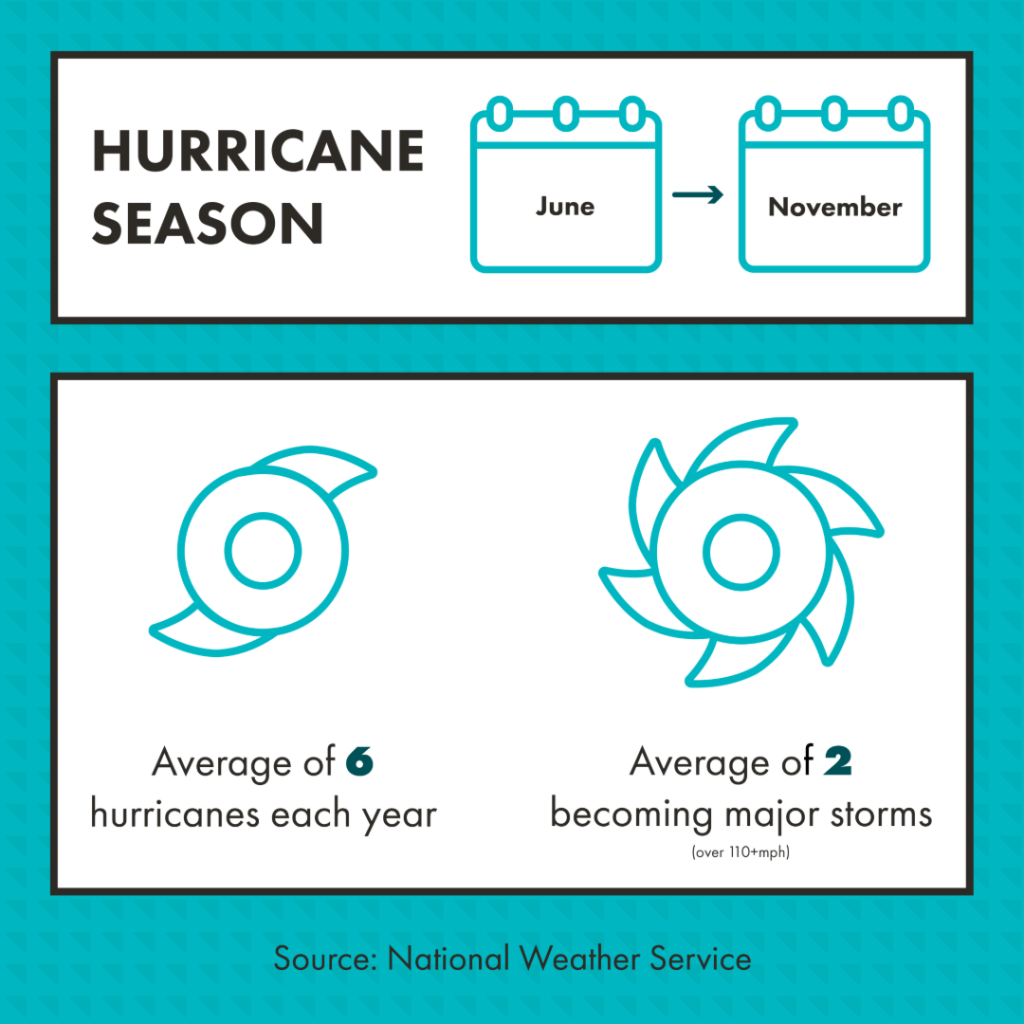
Even on its best days, the logistics industry is considered complicated. Throw a hurricane in the mix, and you can have straight-up chaos. Hurricane Season means supply chains should prepare for the worst in weather, like heavy rain, dangerous gusts of wind, limited visibility, and flooding. Shipping setbacks such as impassable roadways, stranded trucks and drivers, loss of cargo, and extended deliveries are just some of what can be experienced. Here’s what your organization needs to know to prepare during peak Hurricane Season so your company can avoid delays and a loss in revenue.
Supply Chain Tips for Peak Hurricane Season
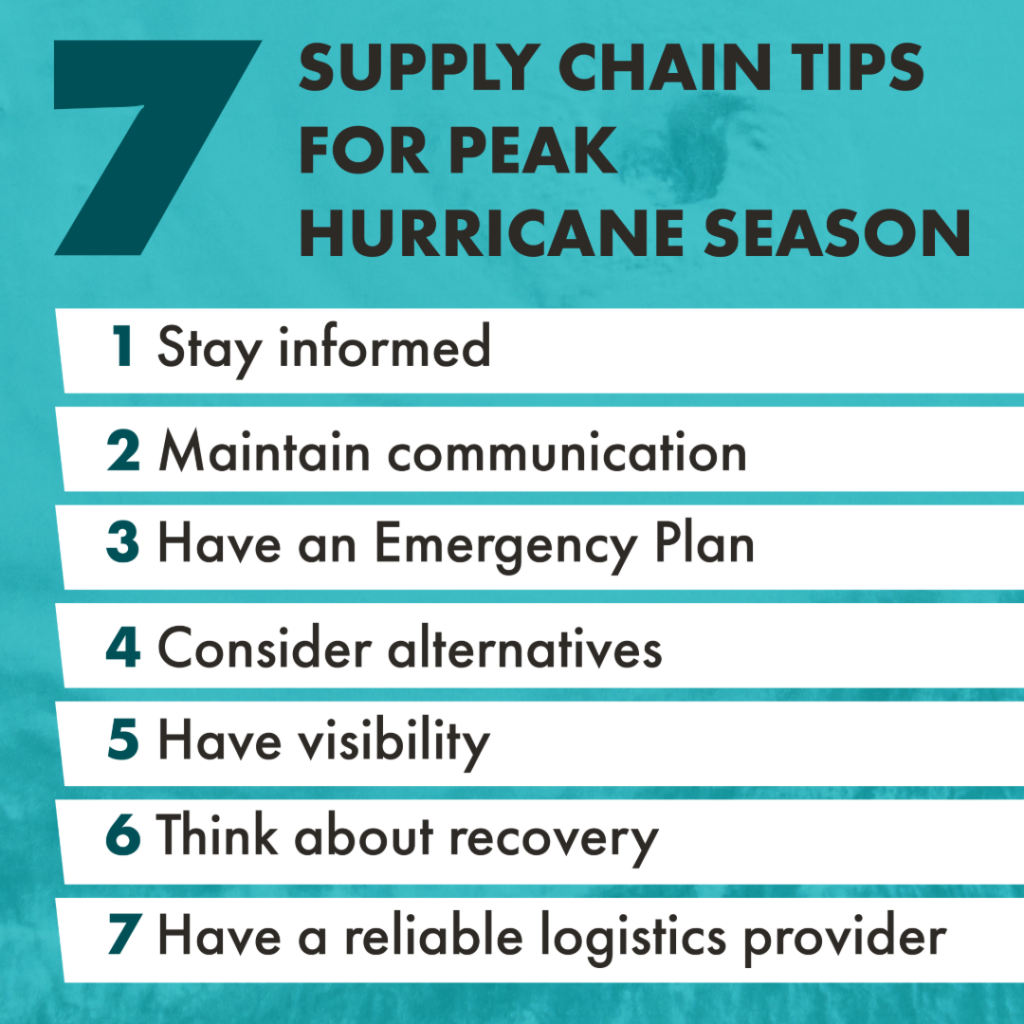
Stay Informed
A hurricane’s path and level of impact can change very quickly. It’s crucial you stay informed of potential storms that could impact your supply chain during Hurricane Season.
Set up alerts to be notified of newly formed storms and hurricanes. When a potential storm is in your path find a trusted weather news source and check it often for updates. Don’t just follow the updates before the storm, but also during and after. You may also adopt and use advanced weather tracking systems to get up-to-date information to make informed, real-time decisions.
Maintain Communication
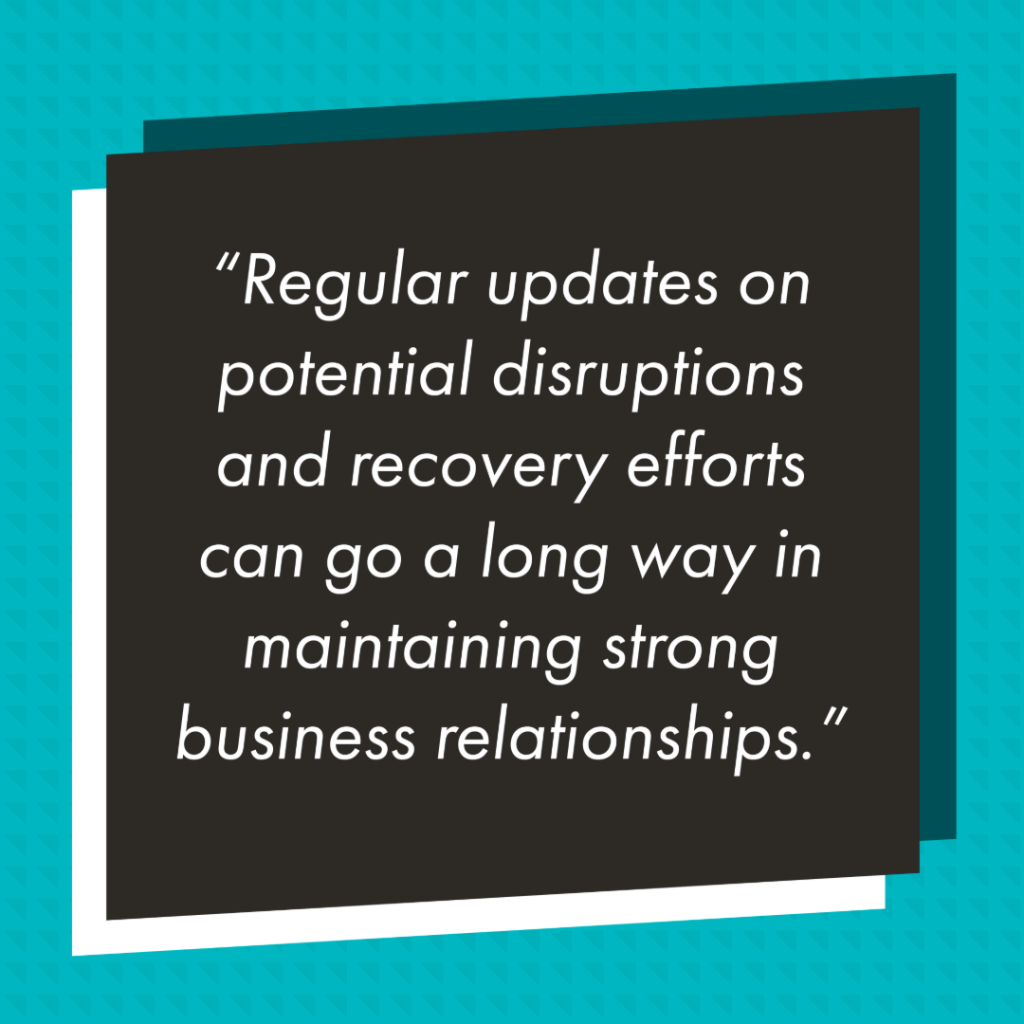
Natural disasters, like hurricanes, can have a huge impact on your company’s supply chain. An easy way to stay ahead is to be transparent and communicate openly throughout. Transparency builds trust and helps manage expectations during a crisis.
If a potential hurricane threatens your business, acknowledge it immediately. Then, start communicating with your customers and partners about the potential effects. Regular updates on potential disruptions and recovery efforts can go a long way in maintaining strong business relationships.
Have an Emergency Plan Ready
You should have a company-wide plan that outlines its actions during a hurricane. Your emergency plan should include important details like;
- an evacuation route for buildings affected
- a crisis communication plan
- assigned employee emergency roles and responsibilities
- instructions on how to protect inventory and equipment
- where emergency supplies are located and how best to use them
- how capable facilities will support when others are affected
When planning, make safety your company’s top priority during a hurricane. Once established, your plan should be reviewed often and updated as needed to ensure it remains effective. Additionally, running practice drills can help everyone know their roles and responsibilities.
Consider Alternatives
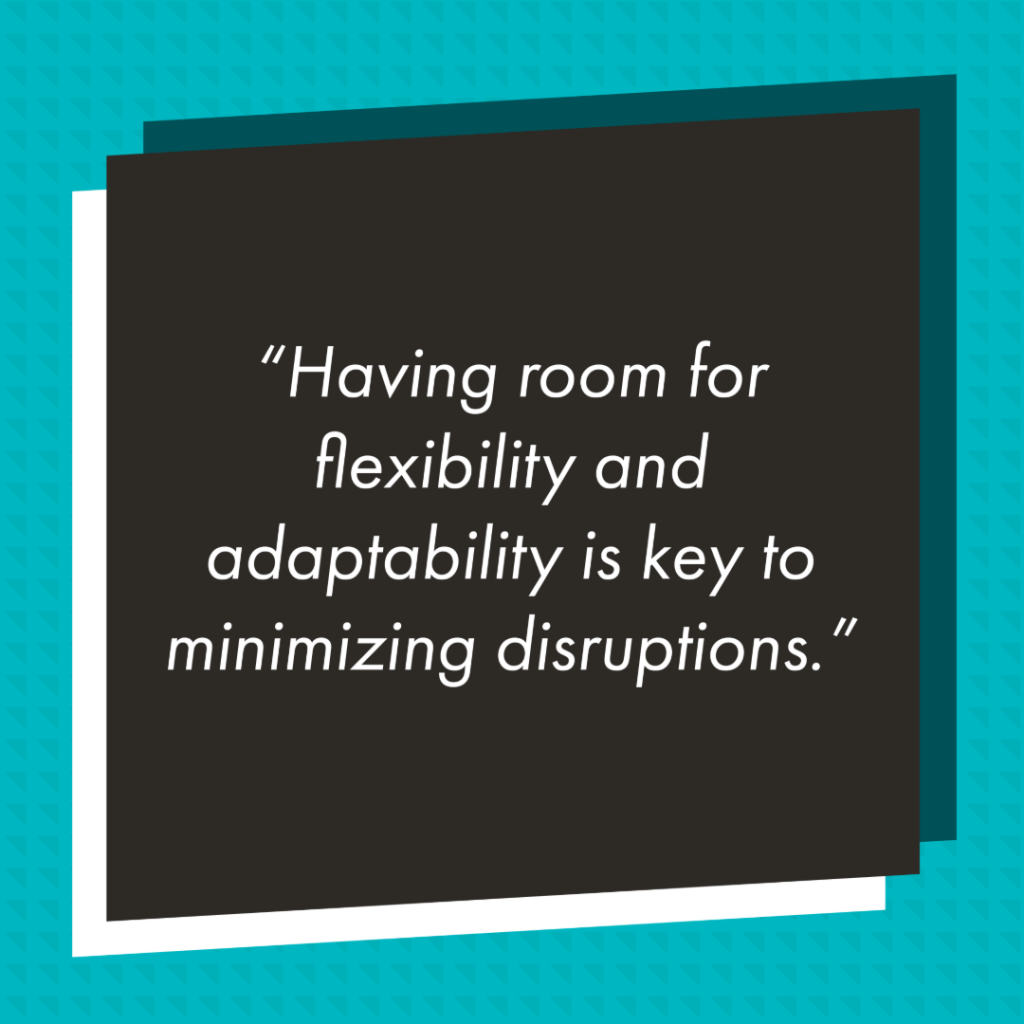
Consider what alternative workspaces and methods of transport you could use in the event of a hurricane. Are there temporary warehouse solutions where inventory could be stored? Could intermodal replace a truckload shipment that’s in the path of the storm? Are there alternative routes? How can facilities outside of the storm’s path support those affected? These alternative options should be included in your emergency plan.
While you may not have all the answers when planning, the more you include, the quicker you can make strategic decisions when needed. Having room for flexibility and adaptability is key to minimizing disruptions.
Have Visibility in Your Supply Chain
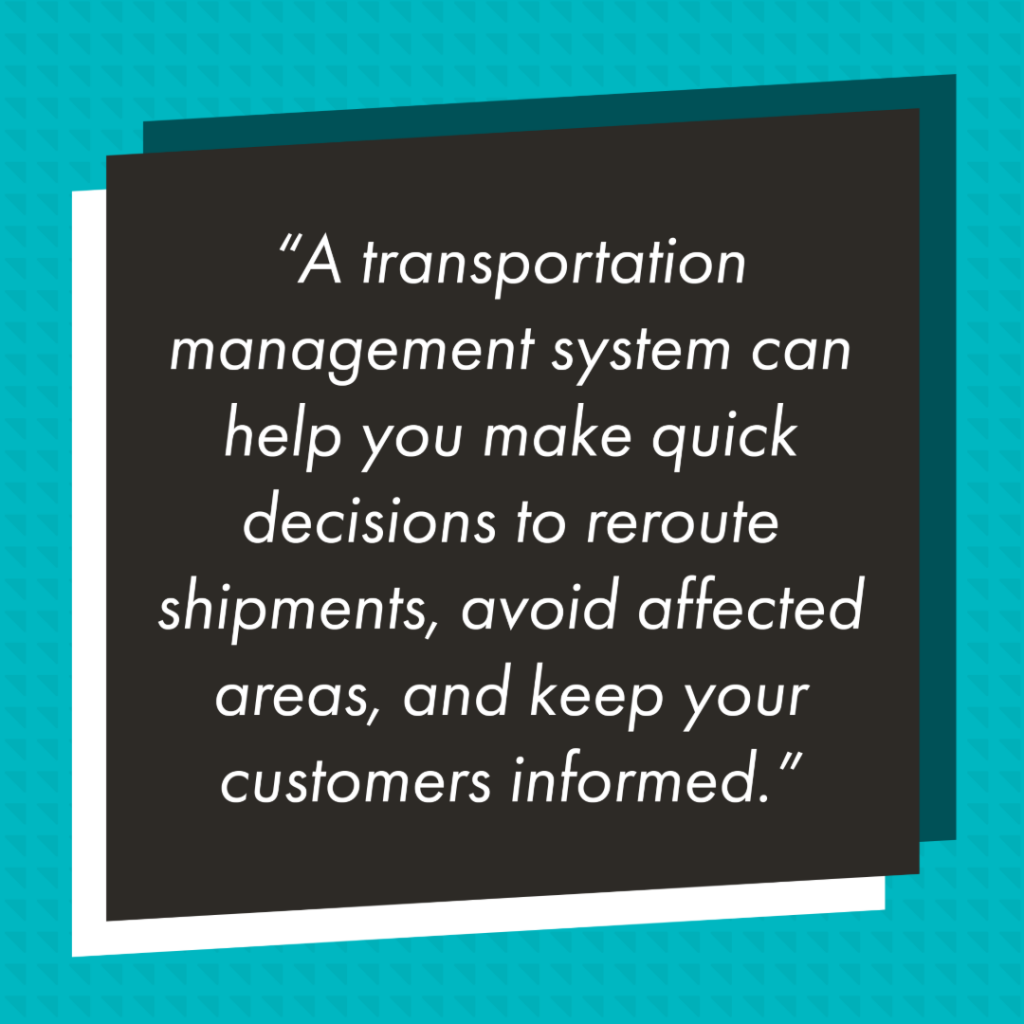
Visibility is needed now more than ever for supply chains. Having visibility not only helps you on good days but especially during hurricane season.
A transportation management system (TMS) can provide the necessary visibility during a hurricane. It provides critical data about your shipments and orders in real-time, giving you an advantage should a problem arise. This can help you make quick decisions to reroute shipments, avoid affected areas, and keep your customers informed.
See how a TMS could help youThink About Recovery
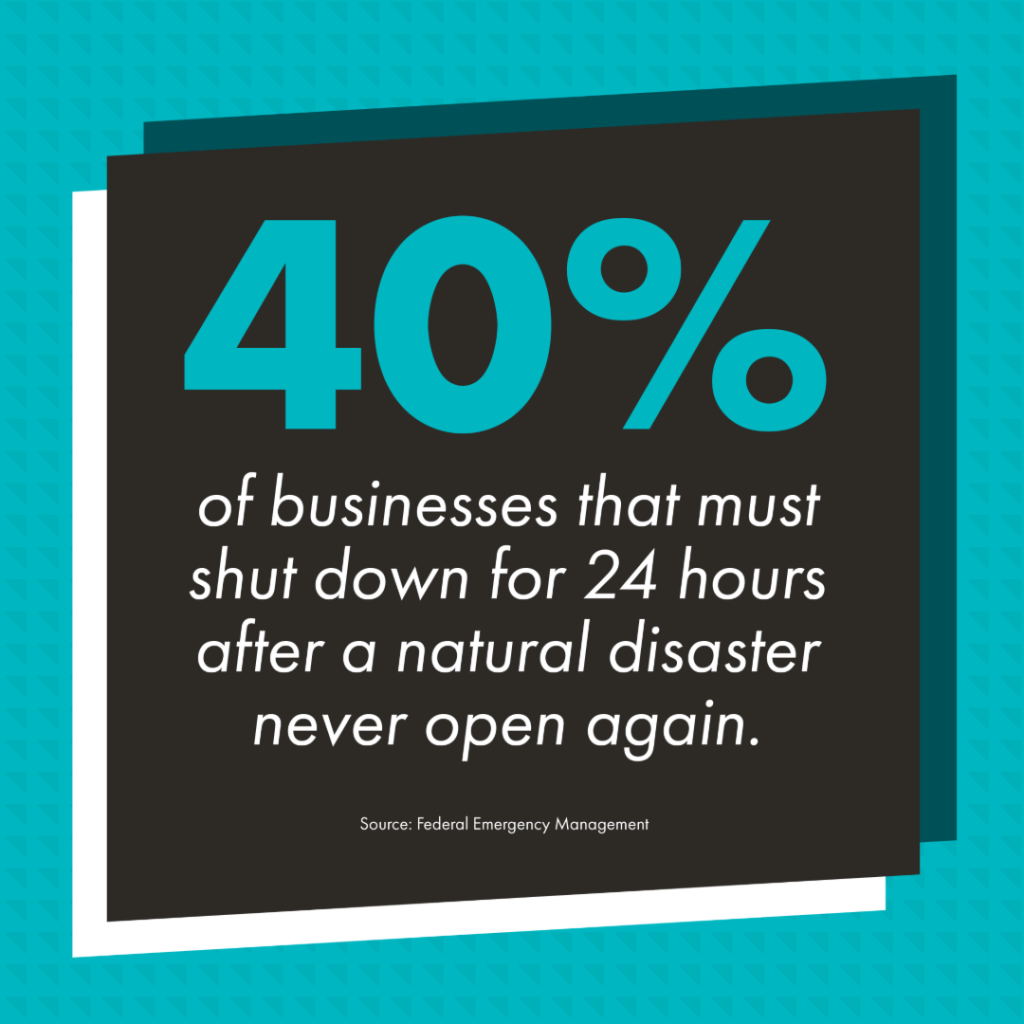
According to the Federal Emergency Management Agency (FEMA), almost 40 percent of businesses that have to shut down for 24 hours due to a natural disaster never open again.
Ensure your business won’t be in that 40 percent if it happens. Have a plan ready to roll for the aftermath of a hurricane. Prepare for the worst and then plan how to recover from it quickly. This will help prevent any potentially steep revenue loss.
Recovery Team, assemble! It’s time to identify the key employees and providers to get your business back to normal operations. An initial assessment will need to take place and your team’s sole responsibility should be to restore and resume processes. Having those alternative solutions and backup suppliers or providers will be handy here.
Weather the Storm with a Reliable Logistics Partner
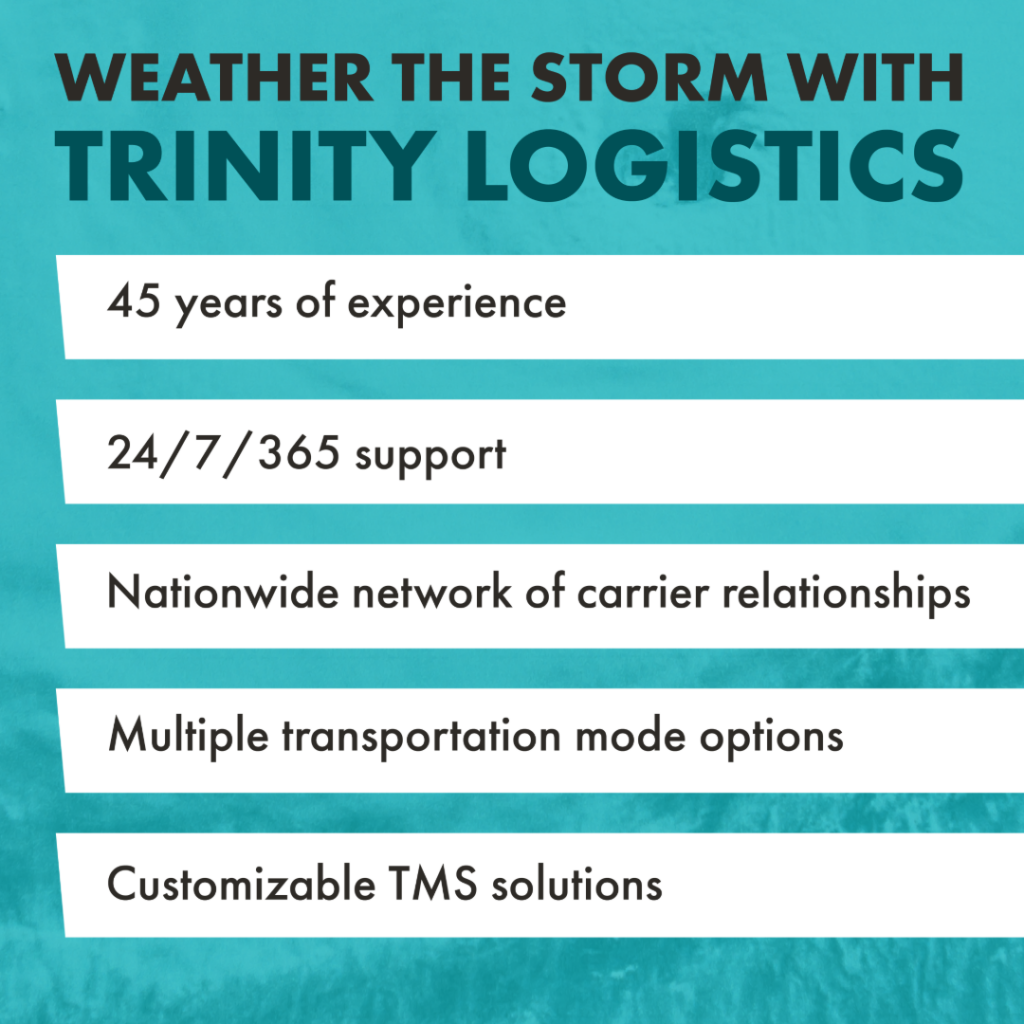
Sometimes, you just need extra help. A relationship with a reliable logistics provider, like Trinity Logistics, can help your supply chain overcome the threats of Hurricane Season.
Hurricanes can roll in a cloudy overcast of unknowns, but Trinity shines a light toward safety and security. We have over 45 years of experience helping thousands of supply chains through ups and downs. We thrive on problem-solving and handling issues like the ones hurricanes can bring. We also have a dedicated After-Hours Team to support and quickly resolve any potential challenges – no matter the time of night, holidays, or weekend.
Our nationwide network of trusted carrier relationships ensures your shipments arrive safely at their delivery locations. Additionally, multiple transportation options offer the flexibility to keep your goods moving. Lastly, we’ll help you find real-time visibility with our customizable Managed Transportation solutions. Our dedicated Team (comprised of six Regional offices across the nation) is ready to help you maintain continuity and resilience in your supply chain.
Partner with Trinity logistics so your supply chain can stay afloat, no matter the weather. (Our exceptional service might just blow you away, though!)
GET A FREE QUOTE ON YOUR NEXT SHIPMENT SUBSCRIBE & STAY IN THE KNOW LEARN MORE ABOUT TRINITY LOGISTICS
Nearshoring to Mexico is the hottest trend in supply chains.
With Mexico now the top trading partner of the U.S., two-way trade hit a whopping $68.5 billion, according to data from the Census Bureau. In the first quarter of 2024 alone, trade has grown two percent between the U.S. and Mexico year-over-year (YoY).
This growth in shipping to and from Mexico is truly just the tip of the iceberg as companies invest in nearshoring strategies. According to Mexico’s Secretary of the Economy, there have been 378 foreign direct investments within the last year, and private sector businesses from the U.S. account for nearly 40 percent of it.
This surge is driven by companies moving parts or all their supply chains to Mexico, thanks to geopolitical tensions and disruptions like the COVID-19 pandemic. These have shone light on the gaps and difficulties faced by globally distributed supply chains. Companies seek more stability and budget-friendly solutions, finding hope in Mexico. While nearshoring to Mexico offers such benefits, there are common cross border shipping snags you should aim to avoid.

What are the Benefits of Nearshoring to Mexico?

Location, Location, Location!
One of the largest benefits of nearshoring to Mexico is its location. Mexico’s proximity to the U.S. means faster shipping times and lower costs. It also offers more reliability, making supply chains less susceptible to disruptions.
Potential for Savings
Labor costs in Mexico are currently among the lowest in North America, even cheaper than in China. This can be a major draw for companies looking to reduce operational expenses. Shorter lead times also offer the potential for enhanced productivity and further cost savings.
Positive Economic Impact
Cutting costs and sped-up deliveries mean smoother operations, happier customers, and a boost in productivity. This isn’t just good for your business but beneficial for the Mexican economy, too. Businesses established in Mexico create new jobs and economic growth. The U.S. benefits, too, with stronger, more resilient supply chains that are less vulnerable to global disruptions.
But There Can Be Cross Border Shipping Snags
Many business owners don’t realize the complexities that come with shipping across the U.S.- Mexico border. Working with the right provider can make all the difference in whether you’ll face these common challenges.
Here are four major cross border shipping challenges you should be aware of with your nearshoring strategy.
Security Concerns

Cargo theft is a major concern in Mexico, with hijackings being the primary tactic. In April 2024, Mexico averaged about five cargo thefts per day, according to the National Association of Vehicle Tracking and Protection Companies. Unfortunately, that’s trending up compared to the previous year, that’s a 7.7 percent rise in activity. Most hijackings involve some type of violence and often involve food and beverage goods, household items, electronics, and auto parts.
Another security obstacle is Mexico’s poor highway infrastructure. The quality of Mexico’s roadways is significantly lower than in the U.S. According to the 2019 Global Competitiveness Report, Mexico ranks 49th out of 141 economies in its road quality. In comparison, the U.S. ranks 17th. Mexico’s lacking infrastructure increases the potential risk of delays and accidents, as well as cargo theft with any truck breakdowns.
Despite all this, Mexican carriers are not required by law to carry cargo insurance. Many choose to opt out of having it and this often results in inadequate coverage of freight. Because of this, it’s recommended to look into securing your own extra coverage and aim to work with carriers that are certified with the Customs Trade Partnership Against Terrorism (CTPAT).
Lost in Translation?

When working with those in other countries, it’s important to know how they operate. This includes Mexico. Understanding the language and business culture is essential to achieving success.
This fact may be well-known, but not everyone in Mexico speaks English! Spanish is the official language, spoken by about 90 percent of its people. According to a 2023 report, only five percent of Mexicans speak English. While larger businesses may have more bilingual employees on hand, dealing with smaller ones can be challenging if you do not have someone who speaks Spanish. Also, much technical or industry-specific jargon doesn’t often translate accurately. Without bilingual representatives available, it can be easy to have miscommunication issues.
Unlike the U.S., where we often like to get straight to business, Mexicans often prioritize building personal relationships before even discussing any professional matters. Due to this, negotiations can often be more indirect. Working with Mexican businesses means you’ll need to invest time in building strong relationships to foster trust and rapport with your contacts.
Facing Cross Border Complexities

Getting your freight across the U.S.–Mexico border can be complex. Many parties are involved, including several carriers and the customs broker. There are also several touchpoints during the shipping process, and disruption can happen at any of them.
Another hurdle shippers must deal with in cross border shipping is the lengthy transit time. Due to inspections, typical wait times for trucks crossing the border, especially from Mexico to the U.S., can range anywhere from three to 10 hours on certain days. Choosing the right crossing point can greatly affect the transit time vastly, and there are 48 points to consider!
Paperwork Troubles

Freight most often gets detained at the border for incomplete documentation.
Shippers are required to fill out many, often repetitive documents. It’s common for this paperwork to get misplaced or for shippers to not even be aware of the exact procedures required by authorities. When any of this important paperwork is left blank or filled out incorrectly, the carrier gets detained at the border until it is resolved. This can add extra days or costs to your shipment.
Ensure all necessary documents are in order, including:
- Commercial invoice (in Spanish)
- Bill of lading
- USMCA certificate of origin (if needed)
- Packing list
- Sales contract
- Proforma commercial invoice
- AES filing
- Customs declaration
- Insurance policy
Having these documents in both Spanish and English can prevent delays and misunderstandings.
Trinity Logistics: The Perfect Partner for Your Nearshoring Strategy

Navigating the complexities of shipping to and from Mexico can be overwhelming! One simple mistake is all it takes to cause delays and additional costs. That’s where finding a reliable logistics provider comes in.
Sure, perhaps you can do it all on your own, but trust us, it’s easier with help. You can outright avoid these four common mistakes when shipping to and from Mexico when you’ve chosen to work with a reputable logistics provider like Trinity Logistics.
We’ve been navigating the waters of cross border shipping for over 45 years, so we understand all the nuances. Our bilingual Team Members and Authorized Agents (some even based in Mexico) get the business culture and fluently speak the language, so there won’t be any miscommunication concerns. Not to mention, our People-Centric service always puts relationships first, regardless of nationality.
We’re customs process experts and have trusted carrier relationships ready to roll. Whether it’s Laredo, El Paso, San Diego, or another major U.S.-Mexico border, we have a variety of transportation modes available.
If nearshoring is part of your supply chain strategy but you’re concerned about shipping to and from Mexico, worry no longer. Instead, consider Trinity Logistics as your cross border copilot. We’ll handle the logistics so you can meet your business goals.
Get a FREE Quote Discover Effortless Cross Border ShippingTrinity Logistics, a leading third-party logistics provider (3PL), is proud to announce its recognition as a Green Supply Chain Partner for 2024 by Inbound Logistics. This prestigious accolade highlights Trinity’s commitment to sustainable and eco-friendly logistics practices.
Each year, Inbound Logistics editors select 75 Green Supply Chain Partners, otherwise known as the G75, that go above and beyond in their efforts to improve supply chain sustainability. These companies demonstrate exceptional leadership and dedication to environmental responsibility and are selected based on their initiatives to reduce their impact, improve efficiency, and overall promote a more sustainable future.
Trinity has a long history of implementing innovative solutions to minimize its environmental footprint including:
- Reducing emissions with an Environmental Protection Agency’s (EPA) SmartWay Transport Partnership
- Practicing chemical safety as a member of Responsible CareⓇ
- Offsetting carbon emissions by collaborating with ClimeCo
- Making sustainable choices in Trinity’s owned offices
- Offering environmentally friendly transportation options, like intermodal
“At Trinity, we’ve always believed in doing the right thing,” said Kristin Deno, Director of Operational Risk at Trinity Logistics. “Being so exclusively recognized for our sustainability efforts is a true testament to our focus in this area. This recognition provides additional drive for us to continue improving practices to support building a greener future.”
LEARN MORE ABOUT TRINITY'S SUSTAINABILITY INITIATIVESAbout Trinity Logistics
Trinity Logistics is a Burris Logistics Company, offering People-Centric Freight Solutions®. Our mission is to deliver creative logistics solutions through a mix of human ingenuity and innovative technology, enriching the lives of those we serve.
For the past 45 years, we’ve been arranging freight for businesses of all sizes in truckload, less-than-truckload (LTL), warehousing, intermodal, drayage, expedited, international, and technology solutions.
We are currently recognized as a Top 100 3PL by Inbound Logistics, and as a Top Company for Women to Work for in Transportation by Women in Trucking.
Cargo theft and fraud is a common topic in many circles these days. No matter where we look, we see it mentioned in news headlines and see its impacts on price increases on the store shelves. In fact, CargoNet recently shared data showcasing that cargo theft has reached a 10-year high, increasing 59 percent year-over-year (YoY) in the U.S. alone.
While cargo theft and fraud have always been a risk in the world of logistics, the kind of theft and fraud we see today is evolving from what we used to know. Years ago, common cargo fraud involved extortion attempts via loads held hostage as well as t-check scams, where bad actors would book shipments and ask for a fuel advance, take the money, and disappear, often without completing delivery or even picking up the shipment they received the payment advance for.
While these kinds of fraud still occur, they are not as prevalent as they once were. Today’s cargo theft and fraud involve new strategies, and it’s important that companies stay aware of emerging tactics and remain vigilant to protect themselves from unnecessary and tragic losses.
The Evolution of Cargo Theft and Fraud
In the past, cargo theft was commonly known as the act of stealing from a truck or even unlawfully taking cargo from a storage facility. Usually this might occur when the truck driver was asleep or when the parked truck was left unattended in an unsecured lot. Now, cargo theft claims for lost product can be especially difficult to navigate as many insurance carriers have specific language and exclusions written within the pages of cargo policies limiting circumstances under which they will cover cargo payment for cargo theft incidents.
For example, some policies may dictate that the truck must travel within a specific radius only and cannot be left unattended unless in a secured lot. Unfortunately, the definition of “secured lot” is wide-ranging and debatable. Does “secured lot” mean there’s a locked fence, good lighting, cameras, surveillance, or a physical security employee on patrol? There’s simply a lot of confusion and unknowns when it comes to cargo theft in general.
The Federal Trade Commission (FTC) recently reported that the top scam type for 2023 involved imposters. We in logistics and other sectors have been experiencing this concept. Scenarios expand beyond just plain and simple identity theft, at least in the logistics industry. The current phase of cargo theft involving identity misappropriation is very strategic. In fact, CargoNet also shared data that strategic theft has increased 430 percent year-over-year (YoY). As quoted by Scott Cornell of Travelers Insurance, “Strategic theft is when they use various means to trick you into giving them the freight and that’s through methods like identity theft, fictitious pickups, double brokering scams, those methods are where we’re seeing the biggest increase over the last 18 months.”
This strategic cargo theft makes incidents that were already puzzling that much more difficult to solve. This kind of cargo theft often spans over multiple state lines (interstate) as opposed to intrastate. When this occurs, jurisdiction is not given to local or state authorities but may extend to federal jurisdiction. However, to establish a case seeking federal help, not only would more than one state need to be involved, but the cargo value must warrant federal attention to exceed $100,000 and perhaps even $500,000 or more, depending on the states involved. You may have police consider strategic cargo theft a civil matter that will not be taken under investigation.
Further, with these scenarios, there is confusion concerning who takes or issues the theft report Should that be the shipper, the receiver, or the freight broker? Is the report filed with law enforcement jurisdiction at the origin where freight was often last seen, or should reports be filed at the delivery jurisdiction, where the cargo never arrived? The cargo owner may attempt to file a police report where the transfer of goods occurred, which is the location where the driver took possession of the cargo for transport.
The State of Strategic Cargo Scams
Certain states like California and Texas have become hotspots for these strategic cargo scams, often involving imposter identities. Many of these fraudsters operate outside the U.S., finding and exploiting weaknesses in the system so products may end up outside the country. This further hurts the U.S. economy when items are produced here and those companies don’t get a financial return, thus losing money that should be going back into the economy. There are other additional costs affecting manufacturers to consider, such as lost time, materials, and labor to duplicate the goods that were originally stolen.
The Federal Motor Carrier Safety Administration (FMCSA) system, originally designed to verify motor carrier legitimacy, has become a target. Phishing scams and other methods have targeted carriers with a motive to change a carrier’s contact information and use their MC authority for nefarious purposes. Bad actors have been caught posing as valid, reputable carrier companies. They often go as far as creating web domains similar to those of established carriers or caught purchasing MC numbers from those going out of business or wishing to exit, especially with the recent market slowdown, with the new buyer updating that company’s contact information. They look and “run” as the previous motor carrier, using that previous authority and reputation to run their scams. This facade allows them to gain possession of or intercept the cargo and divert it to a pre-arranged location for a quick disappearance. The FMCSA is aware of these trending cargo theft scams and is actively looking to improve their vetting and even get rid of MC numbers for carriers.
There’s also a prevalence in double brokering. This is when an unauthorized carrier accepts a shipment or assigns it to another carrier lacking the proper authority to broker it in the first place. It can also involve the re-brokering of shipments without authorization to legitimate entities with broker authority. This creates a chain of uncertainty and lack of control over carrier selection while increasing the likelihood of unpaid delivering carriers, and double payments required from freight brokers and shippers, paying more than agreed for delivery services.
Load boards, while usually valuable tools for shippers and freight brokers to connect with available carriers, are also now breeding grounds for fraud. Fake postings and compromised information have created a haven for scam artists. The more information presented on a load posting, such as commodity, value, or even location, the more opportunity for these scammers to successfully replicate fake loads and even steal rate confirmations from legitimate actors. Detailed information provided on load boards make loads easier targets for those with motive to engage in strategic theft and double brokering.
Cargo fraud involving identity theft is not limited to carrier companies. Scammers also pose as shipper companies. These shipping requests will often come in as inbound leads rather than relationship leads. Scammers create fake web domains and use reputable companies to gain credit access, then use that access to pose as both a shipper and carrier. They’ll orchestrate this fake shipment of theirs, make it look as if it has been delivered with forged paperwork, and collect payment before being found out.
A lot of these shipments involving strategic cargo theft end up being diverted to alternate warehouses. In these cases, it is common for the carrier booked to be legitimate but for a bad actor to somehow get in the middle and divert the driver to deliver to a different location altogether, promising an increase in money. Once the freight arrives at the alternate location, there’s a truck en route or waiting to whisk away the freight quickly. Diverted items do not stay in one place for long, making it difficult to track and recover the cargo.
How to Be Proactive and Prevent Cargo Theft and Fraud
Trust, But Verify
Whether dealing with a shipper company or carrier, thorough verification is needed.
For shippers requests, use sources like ZoomInfo, LinkedIn, and Google. Research the company along with the contact who reached out. Remember that most shipper scams involve inbound leads as opposed to solicited new business or existing relationships. Before agreeing to arrange or transport the movement of goods, use Google Maps to ensure the requested pickup and delivery locations are legitimate.
For example, if the shipping company is a well-known business but Google Maps Street View shows you a location that doesn’t look like one of theirs, something might be off. Another red flag could be if the commodity to be shipped doesn’t line up with their standard business, such as an electronics company trying to ship lumber or rice.
For carrier requests, first vet that they have authority to operate with the FMCSA. View their safety rating and be cognizant of shipper or load-specific requirements, such as drivers who have TWIC cards, and commodity specifics, like cargo type and value. Confirm the carrier has adequate insurance coverage for the shipment they are booking, such as reefer breakdown coverage, if they are to haul a temperature-controlled shipment. Cross-check any other shipment requirements, such as interstate authority or hazmat certifications.
Review relationship and load history if they have a shipment history with you and ensure the new request lines up with previous hauls. Be aware of MC misappropriating. Check if the FMCSA information or profile has recently been updated. Some things to look out for are contact, address, or email address changes. Double-check that the carrier company is not associated with any known bad actors and adhere to your company’s own internal vetting standards.
There are various informational and vetting applications like Highway and Truckstop to further qualify carriers. Ensure the equipment the carrier owns lines up with the equipment required for the shipment. For example, it wouldn’t make sense if a carrier books a temperature-controlled shipment when the carrier owns no refrigerated trailers.
Use Relationships, Limit Load Boards
While load boards offer convenience, strong relationships with carriers provide a significant advantage. Building trust and gaining a deeper understanding of their business reduces your risk of cargo theft and fraud.
When load boards are needed, be strategic with your postings and focus on the security of the information you share. Scam artists often use load boards as a resource for information to replicate or find their next victim. They often look at the locations, the kind of cargo, and more. Avoid posting detailed descriptions of your cargo. Keep the information you share as simple and minimal as possible. Protect that information until the carrier has been both vetted and confirmed.
Trust Your Gut
If something feels wrong at any time, report it to your Risk Team or dedicated personnel right away. With cargo theft, time is of the essence. The first 48 hours are critical as stolen freight typically doesn’t stay in the same place very long. Your best chance of recovering it is within those early hours of noticing it.
Your first line of defense to prevent cargo theft and fraud incidents is your pickup location. Those workers have the eyes and, hopefully, surveillance to see if the truck coming in is the right one. They can check that the MC on the truck is correct, that the driver has the right equipment for that shipment’s requirements, that the driver is the one booked, and that they know the correct location they need to deliver to.
Shippers can also be proactive and place trackers in with their freight, which can be beneficial for trip progress tracking as well if the load gets stolen. While many carriers do have trackers these days, it’s best not to rely solely on them. Scam artists have been known to disable trackers or ping them to another cell phone, making the shipment look like it’s traveling where it is supposed to go, while it is, in fact, stopped or delivering to an alternate location.
Shippers can also ensure they use strong seals that are tamper-proof. Ensure your dock workers are informed and proactive in reducing potential incidents. Shippers may also consider investing in extra shipper’s interest for its product, for a first-party insurance policy which provides a layer of extra protection. Develop strong relationships with the freight brokers you work with. Know who the emergency personnel are on the shipper and broker side and be armed with their contact information so you know exactly who to contact at all times of the day should a theft or another emergency occur during shipping.
Knowledge is Power
Stay in the know of what’s going on and trending in cargo theft and fraud by networking with known associations, like CargoNet and the Transport Asset Protection Association (TAPA), as well as the additional connection of the Transportation Intermediaries Association (TIA) for freight brokers. These organizations constantly educate on evolving threats to keep members aware.
Ensure you have an emergency plan in place and educate your team so you can be well prepared for an incident. Develop relationships with law enforcement and investigation agencies who can help you put the word out about your loss and assist in finding your freight or the scam artists involved.
Combatting Cargo Theft is a Shared Responsibility
Combatting cargo theft and fraud requires collaboration from all within the logistics industry. Shippers, brokers, carriers, legislators and law enforcement must work together to create a more transparent environment with strict accountability to make it more difficult for thieves and fraudsters to operate.
Cargo fraud is growing, and tactics are ever-changing. Even with all the right measures in place, fraud may not be 100 percent preventable. That said, though we can’t stop it all, we can implement not only prevention measures but response strategies. By staying vigilant and educated, we can collectively demonstrate to these bad actors that it’s not worth the effort anymore. It is up to us to create a future where the movement of goods is more efficient and secure than it is today.
Get More Content Like This In Your InboxAbout the Author

Kristin Deno currently holds the role of Director of Operational Risk at Trinity Logistics. Deno holds a Certified Cargo Claims Professional certification through the Certified Claims Professional Accreditation Council (CCPAC), with almost 15 years of experience and knowledge in claims, insurance, compliance, and risk. She has a passion for knowledge and servant leadership, always looking to grow professionally and share her expertise to those interested. She’s well known at Trinity for assisting fellow Team Members, Shippers, and Carriers with complex claims and doing all she can to mitigate any potentially concerning scenarios. Deno consistently looks for opportunities to share her knowledge and insight outside of Trinity, having recently attended the TIA’s 2023 Policy Forum in Washington, D.C., Traveler’s and CargoNet’s Cargo Theft and Transportation in Q4 2023, and the TAPA T1 National Cargo Theft Summit in May 2024.